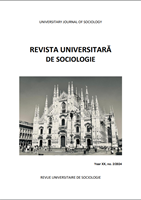SOCIALITY: STRUCTURES, PROCESSES, AND IMPLICATIONS IN THE STUDY OF HUMAN BEHAVIOR
SOCIALITY: STRUCTURES, PROCESSES, AND IMPLICATIONS IN THE STUDY OF HUMAN BEHAVIOR
Author(s): Vlad Ovidiu CioacăSubject(s): Behaviorism, Social Theory, Sociobiology, Sociology of Culture, Sociology of Politics
Published by: Ediktura Beladi
Keywords: sociality; sociability; social structures; social exchange theory; social cohesion;
Summary/Abstract: This article examines sociality and sociability as interdependent concepts, where sociality represents individuals' innate predisposition to engage in social interactions, and sociability reflects the manifestation of these interactions in social networks and relationships. The analysis highlights how social structures influence sociability, with cooperative and participatory forms stimulating it, while competitive and elitist forms inhibit it. Although individuals are shaped by collective norms and values, they retain the capacity to create and innovate, thus facilitating social change and maintaining a balance between stability and evolution in society. Sociological paradigms such as positivism, social exchange theory, and Max Weber's theory of social action provide different frameworks for understanding human interactions. Positivism emphasizes social order, while social exchange theory explores reciprocity and benefit maximization, extending beyond material exchanges to include symbolic relationships. Weber's theory highlights the subjective meaning individuals attribute to their interactions, illustrating the complexity of human motivations. The article also explores the role of religion and morality in maintaining social cohesion, focusing on how they evolve as societies transition from mechanical solidarity to organic solidarity.
Journal: Revista Universitară de Sociologie
- Issue Year: X/2024
- Issue No: 2
- Page Range: 496-514
- Page Count: 19
- Language: English

